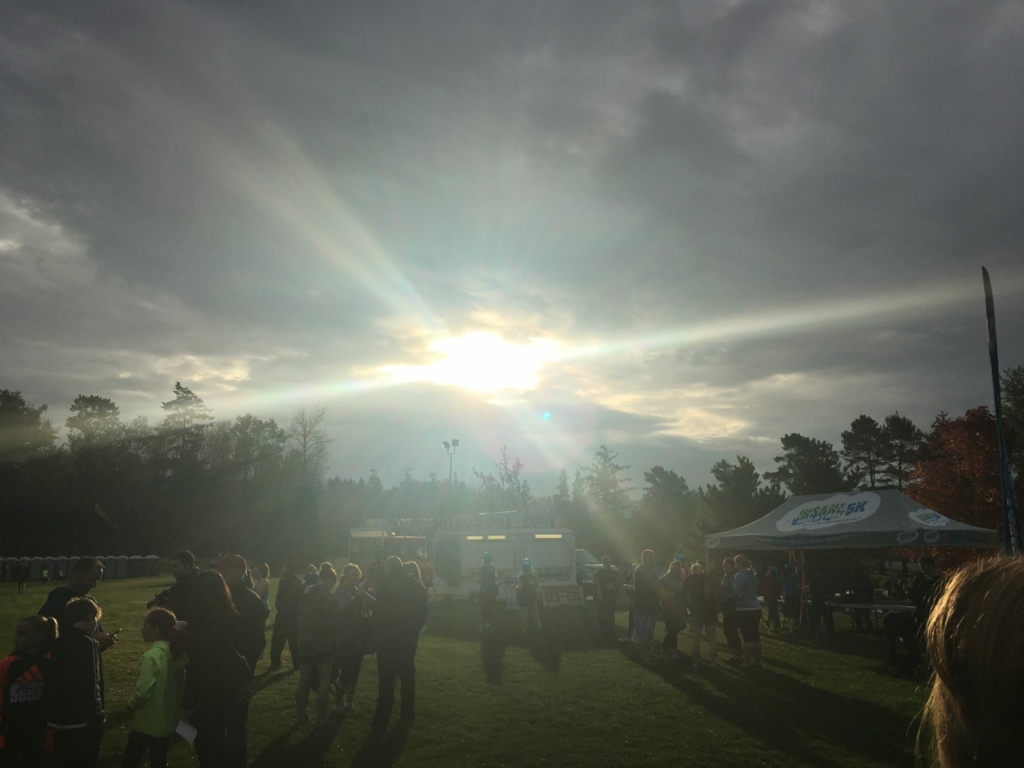
Picture this. You trudge through the last of a huge muddy trench, sweating, tired and cut up. You slog to the finish line and either go through an electric shock or jump over a fire. Once you are done, you lean against a wall shivering, in pain and wondering what the hell you just did. Were the pain and suffering worth it? Most of us say “hell yes” and can’t wait to sign up for another bought of self-torture…
I have often wondered why people are getting into the OCR sport, or why those that used to love it and did as many races as possible, are now stepping away from the sport or retiring. For me, I love this sport as it has enabled me to push my body to limits I didn’t think possible and to get over mental and physical obstacles. I have followed along with my favorite athlete’s and watched them laugh, cry, hobble, win and be defeated. I have opened myself up more than I thought I was able to within this community and have made so many great new friends (many I think of as my muddy OCR family). With just being an average person I have inspired others to go for a run, hit the gym or even tackle OCR for themselves. I thought to myself, why would anyone step away from such a versatile and amazing community and sport? So I posted the question below to my Facebook page as I was curious as to what people thought about this topic.
“I am super curious now. I’ve seen many people say how they are stepping back from ORC or retiring from Tough Mudder / Spartan Races. Is this due to the rising cost, lack of interest or the want to try something different?”
I didn’t think that my post would get as much traction as it did, and was intrigued by the variation in answers that I received. With permission from the posters, I will share some of their thoughts/comments and then sum it all up.
Why People Love OCR:
Mike Aichholz – I am addicted to OCR and know it it’s expensive mentally, physically as well as financially. I’m lucky enough to have a very supportive wife and a boss (who is addicted to half marathons and who gets it), allowing me to leave early on a Friday to catch a red eye flight to some location in the middle of nowhere to complete a race on no sleep. Is this sustainable? Hell no. I think the biggest thing to remember is what made you want to do OCR, to begin with. For me, it’s the challenge of accomplishment.
Cerys Cook – I love OCR’s and can’t see myself stopping anytime soon. At 46 I am in the best shape of my life and keep getting better and challenging obstacles! Always something to overcome.
Allison Tai: I haven’t had an overuse injury since switching to OCR and I had a TON before. Plus I get bored really easily, and I’ve never been as fit. So I will be leaving OCR .. never!
Amanda Fex: I love it! Always will! But like anything balance is good.
Jaclyn Pruett Ung: I still love it but now that I’ve earned my Trifecta two years in a row I am ready to try something new and change it up a bit next year.
Why people are stepping away from OCR
Liana Griffith: I semi stopped OCR’s for 2 years due to surgery and then to cost.
Jamie Gonek: For me it’s the cost and the rising number of hours needed to earn a race as a volunteer. As a single parent of 4, I can’t just justify the rising costs and travel costs.
Lynette Fields: The wear and tear. This is the most stressful point in my life with responsibilities and kids and I ran my body into the ground last year with OCR racing.
Trevor Klassen: For me, it is a part cost when considering races and travel expenses. And just some lack of fun anymore. Trying to find the fun again by racing with friends and not so competitive.
Amy Collette: I went super hard my 2015 year and I realized I spend most of the season tired and hurting. Also, it is expensive. After a year off I’ve found I am more functional, and haven’t gone crazy every single race.
Our very own Margaret Schlachter had her own thoughts on the OCR cycle:
There is a pattern and cycle to most athletes. Try it, get hooked, go overboard, burn out, pull back a little or leave completely. It’s a 3-4 year cycle for most people. Some stick around, many do not, at year eight in the sport (in the states) we are on generate three or so. I think we are just in the next wave.
I received many more comments regarding this topic, but it seems that there is a common theme amongst most of them.
1. Overtraining – doing so many events you are run down, injured or fatigued.
2. Rising costs of travel, accommodation, registration and various race related fees.
3. Lack of innovation in various race series. You can only do the same thing so many times before one gets bored.
4. The worry of being injured and seriously hurt – I get this, but going into any sport there is always an injury risk – you need to know your limits and if you don’t feel safe, then do not participate in an obstacle (SAFETY first always).
Thinking about my own experiences thus far in the community, I can relate to struggling with the rising costs of the race/transportation/accommodation and honestly the lack of innovation in some race series. When I got into this sport, it was exciting and new and I wanted to push myself past my own pre-defined limits (which I have). At this point in time, I am starting to see the same obstacles at multiple races, and although they still present a challenge, there is not a lot of “unknown” for me to experience. I have worked on personally curbing the boredom factor by racing with friends (and having fun), as well as doing different types of obstacle races. I don’t want to take myself too seriously in this sport, as I love how strong I have become, but at the same time I want to feel scared, excited, and challenged more.
What one gets out of the sport is up to the person, but maybe it’s time that we all take a step back and re-evaluate what it is about OCR that drew us in, and what we can do to keep it fun, challenging and exciting on a personal level. Each person is different and I have a feeling the more this sport races and matures, the more the participants in it will grow and mature too. I also think the more feedback the OCR companies collect and try and implement the better – when a participant or a group of participants feel they are being truly listened to and see change, they will want to keep coming back and bringing more friends.
CHANGE is good!!
Disclaimer: The viewpoints expressed by the authors do not necessarily reflect the opinions, viewpoints and official policies of Mud Run Guide LLC, or their staff. The comments posted on this Website are solely the opinions of the posters.


OCR got me off the couch. Since then it has been something that has helped me start eating better & it is something that has pushed me to keep myself fit. Only 4 years ago I was a coach potato. Now I’m fairly active within the OCR Community. I’m just a big kid at heart & I enjoy playing in the mud & just have a tonne of fun when I participate in an OCR. I don’t really run it, I have fun with it. I may do a fun obstacle a few times, then help others through it & then move on. Heck, I may even bypass one that I am not in the mood for, but I will typically do my best to suck it up or ask for help as there is usually a helping hand nearby. For me, it’s the challenge of getting through & sometimes the sheer fun of finishing the obstacles that keeps me coming back. The OCR community is another reason I keep coming back. To help others & hear their stories of how they got to where they are is always fascinating. Yes, some of the races are becoming repetitive but I make of it what I can & I try to make it fun & do what I can to make it memorable for others. I often see people having troubles with the penalties of not completing an obstacle. If your in the open heat & not competing, I say to heck with finishing all the penalties if all it’s going to do is gas you & leave you not enjoying the rest of the event. Penalty = 30 Burpies? do 5 if that’s all you think you can do. It’s YOU’RE race. You paid to be there & do this to yourself. It’s a starting point, you can always work up to 10 or more the next time or the time after that. I hope I don’t fade away from loving this journey any time soon as it’s been a great ride so far & I hope it still has plenty of twists & turns to come!
I think I will slow it down in 2018. 2015 – 2017 were at least one a month, if not more.
the community is amazing, the challenges are always there…but, there is the cost and some of the fatigue. We are not as young as we used to be. 🙂
I just get tired of the driving….that used to be part of the adventure going to a race, now it just feels like a necessary hurdle to get to some fun. The costs aren’t that bad until you get the hidden fees and the parking (which BTW I am giving for someone to park me super far away from where I need to go despite being one of the first cars in the lot at most races. As for the races themselves, most of them are still awesome. Regardless if obstacles don’t always change, the terrain does, the order of obstacles can change up and provide challenges in just what they are laid out along side with and in a lot of cases they can send the course wherever the hell they want to. Except at Stratton where apparently there are some birds that throw their eggs in the mix. Most keep upping the bling at the end. I’m not a HUGE fan of MOC as I feel once I lose it my motivation to push hard just disappears. I wish more races had a significant penalty system instead of just strict DQ. Ex…failing a very tough obstacle could mean 2 laps of a penalty course where a volunteer gives you a certain colour stickon wrist band to represent 2 laps, or a different colour to represent a 1 lap penalty. This lap penalty could be in a central location with lots of obstacles surrounding it so they wouldn’t have to create many different penalty laps. Anyways, you complete them (rather than wondering if someone did 20 or 25 burpees but not 30. I would like this as it would allow all competitors to finish in the results and give motivation for them to continue strong to catch anyone who has passed by them during the penalty loop(s)